Importance of Academic Integrity and Implications of Academic Misconduct
VerifiedAdded on 2023/06/10
|10
|2485
|332
AI Summary
This study provides an overview of academic integrity and its significance, as well as the consequences of different types of scholarly malpractice. It also includes a reflection of the steps and difficulties encountered in producing a game for Assignment 2 and the skills learnt this academic year and their utilisation in the game.
Contribute Materials
Your contribution can guide someone’s learning journey. Share your
documents today.
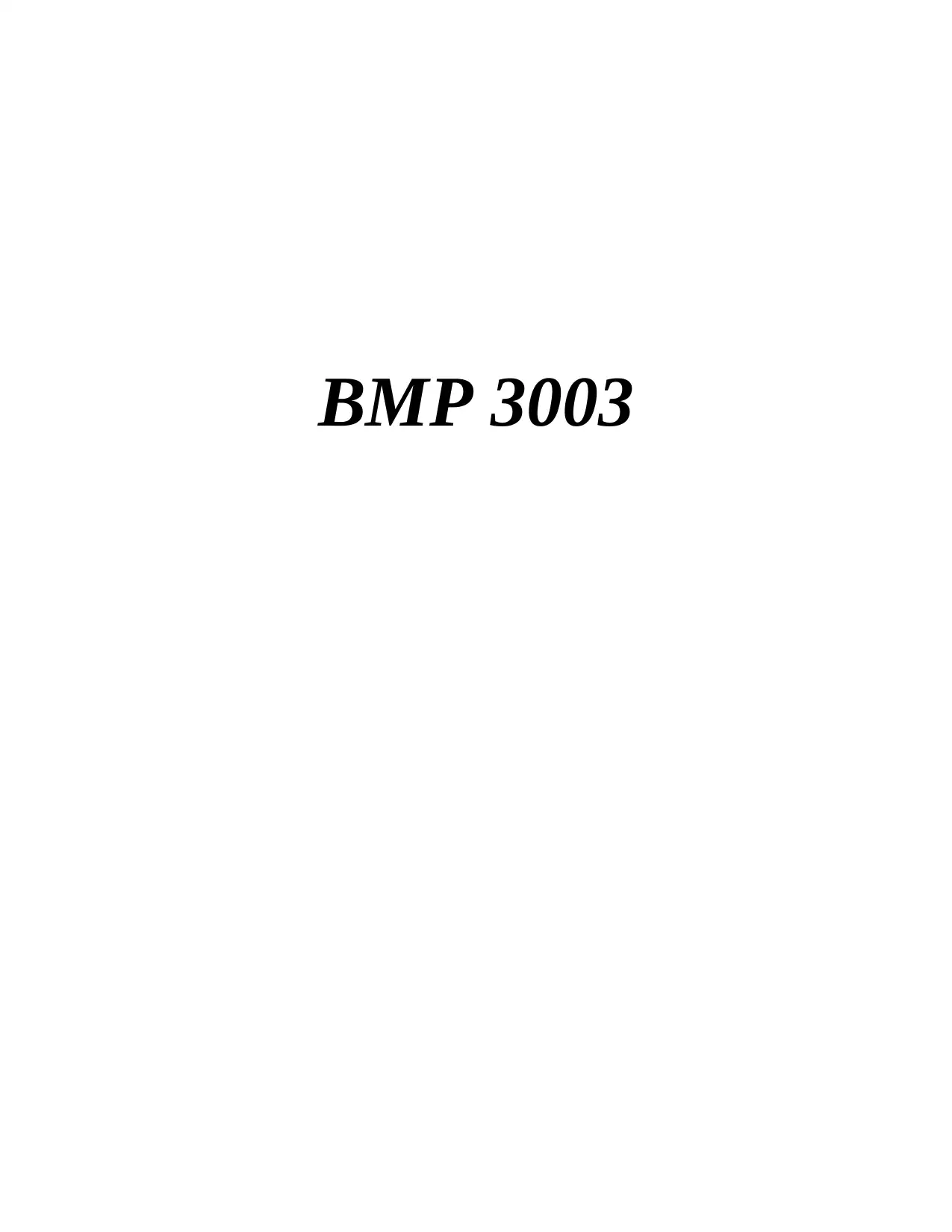
BMP 3003
Secure Best Marks with AI Grader
Need help grading? Try our AI Grader for instant feedback on your assignments.
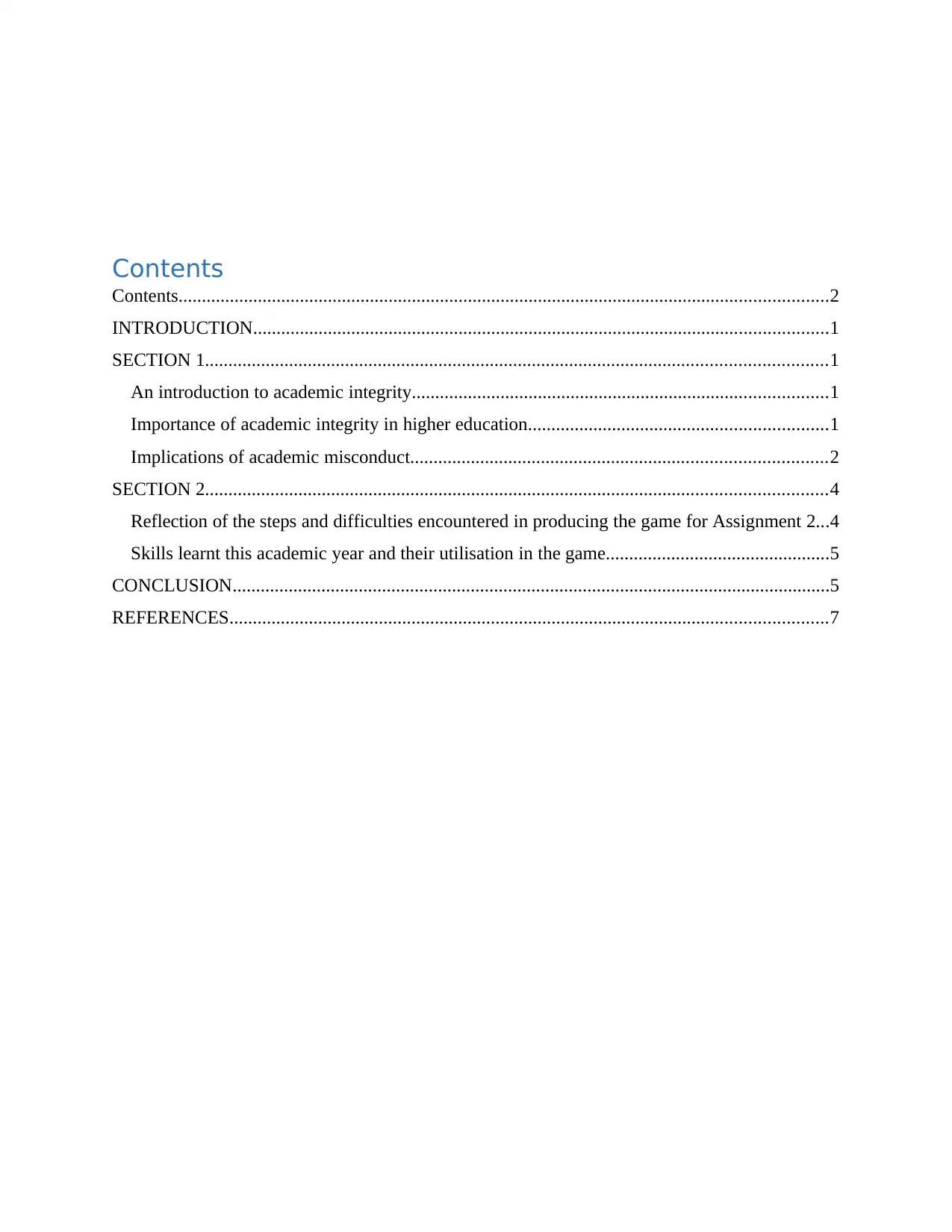
Contents
Contents...........................................................................................................................................2
INTRODUCTION...........................................................................................................................1
SECTION 1.....................................................................................................................................1
An introduction to academic integrity.........................................................................................1
Importance of academic integrity in higher education................................................................1
Implications of academic misconduct.........................................................................................2
SECTION 2.....................................................................................................................................4
Reflection of the steps and difficulties encountered in producing the game for Assignment 2...4
Skills learnt this academic year and their utilisation in the game................................................5
CONCLUSION................................................................................................................................5
REFERENCES................................................................................................................................7
Contents...........................................................................................................................................2
INTRODUCTION...........................................................................................................................1
SECTION 1.....................................................................................................................................1
An introduction to academic integrity.........................................................................................1
Importance of academic integrity in higher education................................................................1
Implications of academic misconduct.........................................................................................2
SECTION 2.....................................................................................................................................4
Reflection of the steps and difficulties encountered in producing the game for Assignment 2...4
Skills learnt this academic year and their utilisation in the game................................................5
CONCLUSION................................................................................................................................5
REFERENCES................................................................................................................................7

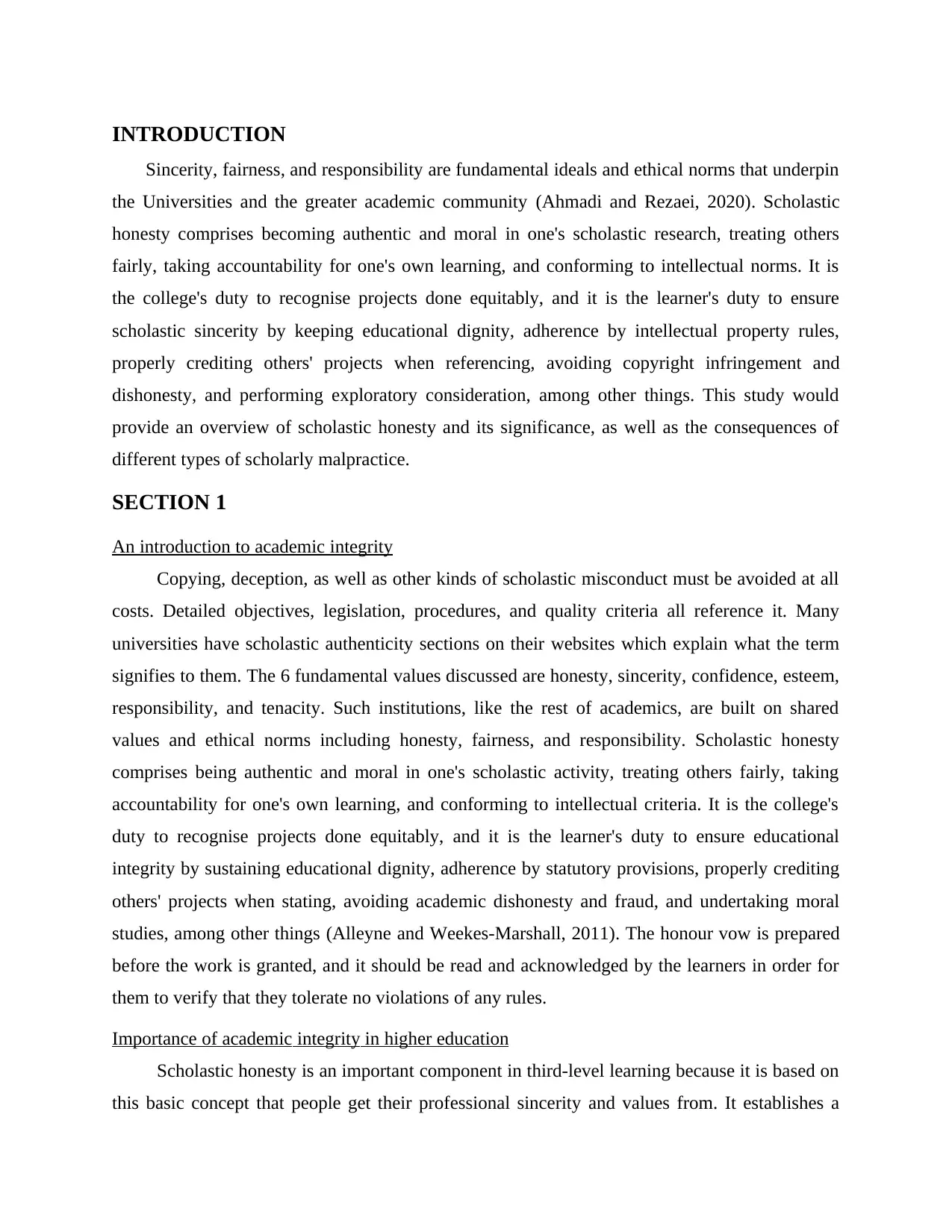
INTRODUCTION
Sincerity, fairness, and responsibility are fundamental ideals and ethical norms that underpin
the Universities and the greater academic community (Ahmadi and Rezaei, 2020). Scholastic
honesty comprises becoming authentic and moral in one's scholastic research, treating others
fairly, taking accountability for one's own learning, and conforming to intellectual norms. It is
the college's duty to recognise projects done equitably, and it is the learner's duty to ensure
scholastic sincerity by keeping educational dignity, adherence by intellectual property rules,
properly crediting others' projects when referencing, avoiding copyright infringement and
dishonesty, and performing exploratory consideration, among other things. This study would
provide an overview of scholastic honesty and its significance, as well as the consequences of
different types of scholarly malpractice.
SECTION 1
An introduction to academic integrity
Copying, deception, as well as other kinds of scholastic misconduct must be avoided at all
costs. Detailed objectives, legislation, procedures, and quality criteria all reference it. Many
universities have scholastic authenticity sections on their websites which explain what the term
signifies to them. The 6 fundamental values discussed are honesty, sincerity, confidence, esteem,
responsibility, and tenacity. Such institutions, like the rest of academics, are built on shared
values and ethical norms including honesty, fairness, and responsibility. Scholastic honesty
comprises being authentic and moral in one's scholastic activity, treating others fairly, taking
accountability for one's own learning, and conforming to intellectual criteria. It is the college's
duty to recognise projects done equitably, and it is the learner's duty to ensure educational
integrity by sustaining educational dignity, adherence by statutory provisions, properly crediting
others' projects when stating, avoiding academic dishonesty and fraud, and undertaking moral
studies, among other things (Alleyne and Weekes-Marshall, 2011). The honour vow is prepared
before the work is granted, and it should be read and acknowledged by the learners in order for
them to verify that they tolerate no violations of any rules.
Importance of academic integrity in higher education
Scholastic honesty is an important component in third-level learning because it is based on
this basic concept that people get their professional sincerity and values from. It establishes a
Sincerity, fairness, and responsibility are fundamental ideals and ethical norms that underpin
the Universities and the greater academic community (Ahmadi and Rezaei, 2020). Scholastic
honesty comprises becoming authentic and moral in one's scholastic research, treating others
fairly, taking accountability for one's own learning, and conforming to intellectual norms. It is
the college's duty to recognise projects done equitably, and it is the learner's duty to ensure
scholastic sincerity by keeping educational dignity, adherence by intellectual property rules,
properly crediting others' projects when referencing, avoiding copyright infringement and
dishonesty, and performing exploratory consideration, among other things. This study would
provide an overview of scholastic honesty and its significance, as well as the consequences of
different types of scholarly malpractice.
SECTION 1
An introduction to academic integrity
Copying, deception, as well as other kinds of scholastic misconduct must be avoided at all
costs. Detailed objectives, legislation, procedures, and quality criteria all reference it. Many
universities have scholastic authenticity sections on their websites which explain what the term
signifies to them. The 6 fundamental values discussed are honesty, sincerity, confidence, esteem,
responsibility, and tenacity. Such institutions, like the rest of academics, are built on shared
values and ethical norms including honesty, fairness, and responsibility. Scholastic honesty
comprises being authentic and moral in one's scholastic activity, treating others fairly, taking
accountability for one's own learning, and conforming to intellectual criteria. It is the college's
duty to recognise projects done equitably, and it is the learner's duty to ensure educational
integrity by sustaining educational dignity, adherence by statutory provisions, properly crediting
others' projects when stating, avoiding academic dishonesty and fraud, and undertaking moral
studies, among other things (Alleyne and Weekes-Marshall, 2011). The honour vow is prepared
before the work is granted, and it should be read and acknowledged by the learners in order for
them to verify that they tolerate no violations of any rules.
Importance of academic integrity in higher education
Scholastic honesty is an important component in third-level learning because it is based on
this basic concept that people get their professional sincerity and values from. It establishes a
Secure Best Marks with AI Grader
Need help grading? Try our AI Grader for instant feedback on your assignments.
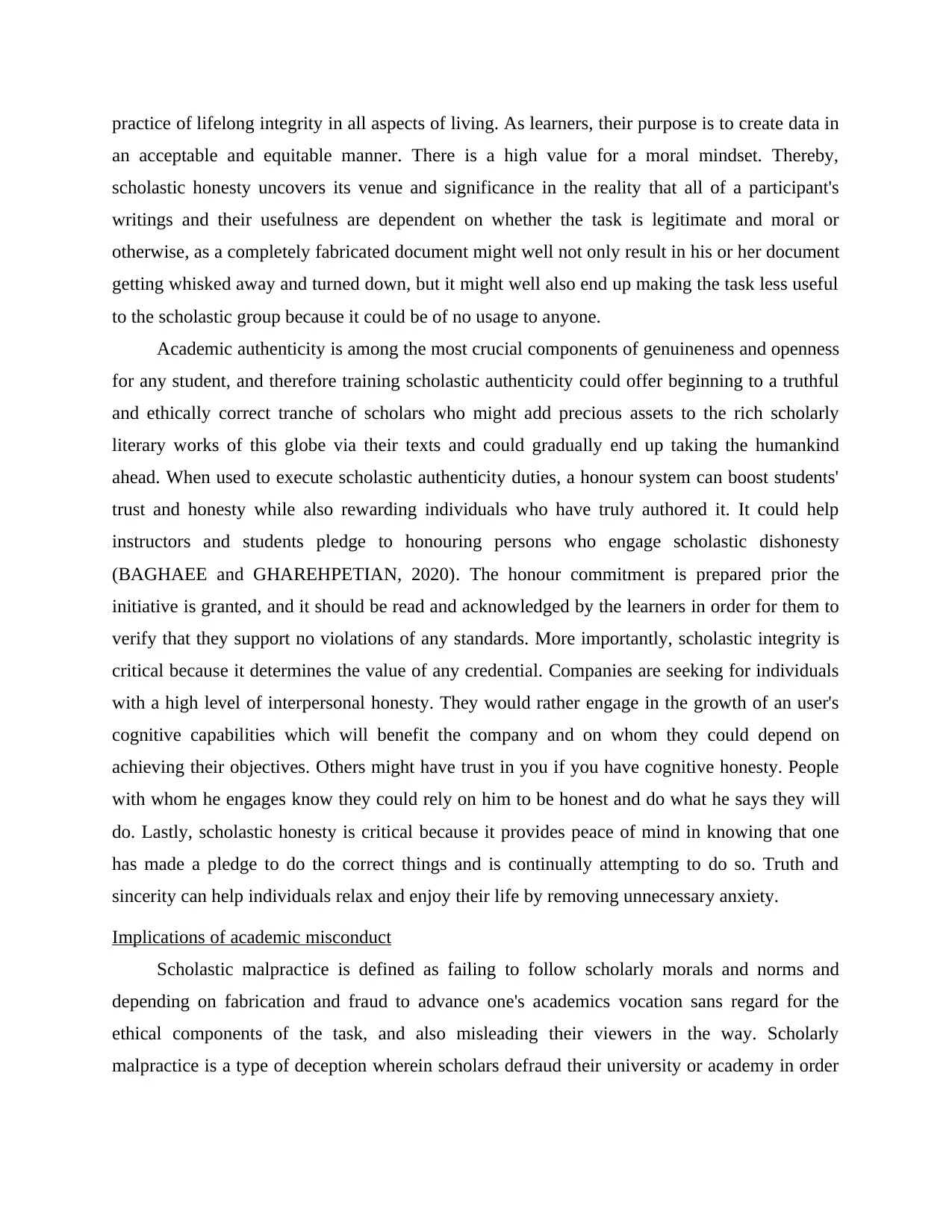
practice of lifelong integrity in all aspects of living. As learners, their purpose is to create data in
an acceptable and equitable manner. There is a high value for a moral mindset. Thereby,
scholastic honesty uncovers its venue and significance in the reality that all of a participant's
writings and their usefulness are dependent on whether the task is legitimate and moral or
otherwise, as a completely fabricated document might well not only result in his or her document
getting whisked away and turned down, but it might well also end up making the task less useful
to the scholastic group because it could be of no usage to anyone.
Academic authenticity is among the most crucial components of genuineness and openness
for any student, and therefore training scholastic authenticity could offer beginning to a truthful
and ethically correct tranche of scholars who might add precious assets to the rich scholarly
literary works of this globe via their texts and could gradually end up taking the humankind
ahead. When used to execute scholastic authenticity duties, a honour system can boost students'
trust and honesty while also rewarding individuals who have truly authored it. It could help
instructors and students pledge to honouring persons who engage scholastic dishonesty
(BAGHAEE and GHAREHPETIAN, 2020). The honour commitment is prepared prior the
initiative is granted, and it should be read and acknowledged by the learners in order for them to
verify that they support no violations of any standards. More importantly, scholastic integrity is
critical because it determines the value of any credential. Companies are seeking for individuals
with a high level of interpersonal honesty. They would rather engage in the growth of an user's
cognitive capabilities which will benefit the company and on whom they could depend on
achieving their objectives. Others might have trust in you if you have cognitive honesty. People
with whom he engages know they could rely on him to be honest and do what he says they will
do. Lastly, scholastic honesty is critical because it provides peace of mind in knowing that one
has made a pledge to do the correct things and is continually attempting to do so. Truth and
sincerity can help individuals relax and enjoy their life by removing unnecessary anxiety.
Implications of academic misconduct
Scholastic malpractice is defined as failing to follow scholarly morals and norms and
depending on fabrication and fraud to advance one's academics vocation sans regard for the
ethical components of the task, and also misleading their viewers in the way. Scholarly
malpractice is a type of deception wherein scholars defraud their university or academy in order
an acceptable and equitable manner. There is a high value for a moral mindset. Thereby,
scholastic honesty uncovers its venue and significance in the reality that all of a participant's
writings and their usefulness are dependent on whether the task is legitimate and moral or
otherwise, as a completely fabricated document might well not only result in his or her document
getting whisked away and turned down, but it might well also end up making the task less useful
to the scholastic group because it could be of no usage to anyone.
Academic authenticity is among the most crucial components of genuineness and openness
for any student, and therefore training scholastic authenticity could offer beginning to a truthful
and ethically correct tranche of scholars who might add precious assets to the rich scholarly
literary works of this globe via their texts and could gradually end up taking the humankind
ahead. When used to execute scholastic authenticity duties, a honour system can boost students'
trust and honesty while also rewarding individuals who have truly authored it. It could help
instructors and students pledge to honouring persons who engage scholastic dishonesty
(BAGHAEE and GHAREHPETIAN, 2020). The honour commitment is prepared prior the
initiative is granted, and it should be read and acknowledged by the learners in order for them to
verify that they support no violations of any standards. More importantly, scholastic integrity is
critical because it determines the value of any credential. Companies are seeking for individuals
with a high level of interpersonal honesty. They would rather engage in the growth of an user's
cognitive capabilities which will benefit the company and on whom they could depend on
achieving their objectives. Others might have trust in you if you have cognitive honesty. People
with whom he engages know they could rely on him to be honest and do what he says they will
do. Lastly, scholastic honesty is critical because it provides peace of mind in knowing that one
has made a pledge to do the correct things and is continually attempting to do so. Truth and
sincerity can help individuals relax and enjoy their life by removing unnecessary anxiety.
Implications of academic misconduct
Scholastic malpractice is defined as failing to follow scholarly morals and norms and
depending on fabrication and fraud to advance one's academics vocation sans regard for the
ethical components of the task, and also misleading their viewers in the way. Scholarly
malpractice is a type of deception wherein scholars defraud their university or academy in order
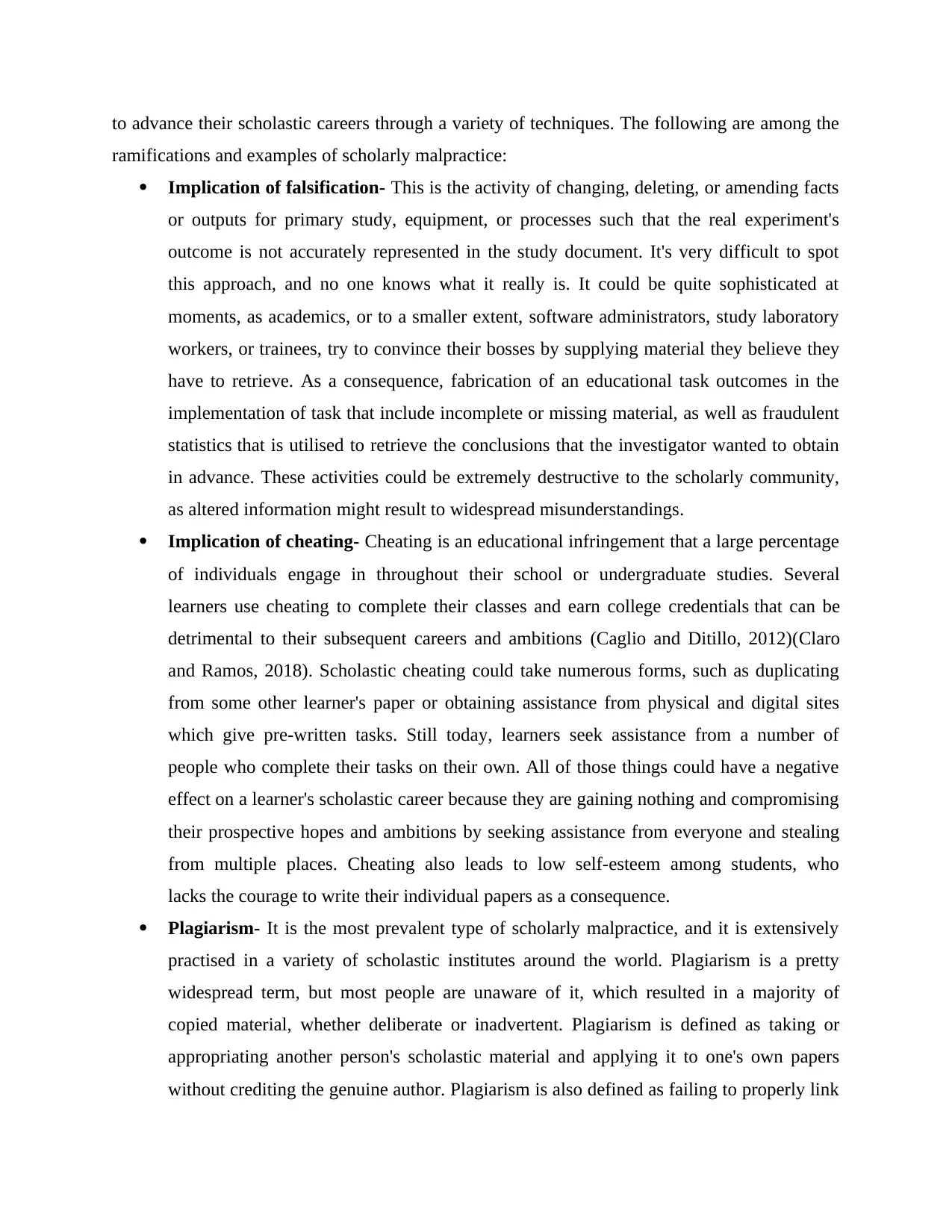
to advance their scholastic careers through a variety of techniques. The following are among the
ramifications and examples of scholarly malpractice:
Implication of falsification- This is the activity of changing, deleting, or amending facts
or outputs for primary study, equipment, or processes such that the real experiment's
outcome is not accurately represented in the study document. It's very difficult to spot
this approach, and no one knows what it really is. It could be quite sophisticated at
moments, as academics, or to a smaller extent, software administrators, study laboratory
workers, or trainees, try to convince their bosses by supplying material they believe they
have to retrieve. As a consequence, fabrication of an educational task outcomes in the
implementation of task that include incomplete or missing material, as well as fraudulent
statistics that is utilised to retrieve the conclusions that the investigator wanted to obtain
in advance. These activities could be extremely destructive to the scholarly community,
as altered information might result to widespread misunderstandings.
Implication of cheating- Cheating is an educational infringement that a large percentage
of individuals engage in throughout their school or undergraduate studies. Several
learners use cheating to complete their classes and earn college credentials that can be
detrimental to their subsequent careers and ambitions (Caglio and Ditillo, 2012)(Claro
and Ramos, 2018). Scholastic cheating could take numerous forms, such as duplicating
from some other learner's paper or obtaining assistance from physical and digital sites
which give pre-written tasks. Still today, learners seek assistance from a number of
people who complete their tasks on their own. All of those things could have a negative
effect on a learner's scholastic career because they are gaining nothing and compromising
their prospective hopes and ambitions by seeking assistance from everyone and stealing
from multiple places. Cheating also leads to low self-esteem among students, who
lacks the courage to write their individual papers as a consequence.
Plagiarism- It is the most prevalent type of scholarly malpractice, and it is extensively
practised in a variety of scholastic institutes around the world. Plagiarism is a pretty
widespread term, but most people are unaware of it, which resulted in a majority of
copied material, whether deliberate or inadvertent. Plagiarism is defined as taking or
appropriating another person's scholastic material and applying it to one's own papers
without crediting the genuine author. Plagiarism is also defined as failing to properly link
ramifications and examples of scholarly malpractice:
Implication of falsification- This is the activity of changing, deleting, or amending facts
or outputs for primary study, equipment, or processes such that the real experiment's
outcome is not accurately represented in the study document. It's very difficult to spot
this approach, and no one knows what it really is. It could be quite sophisticated at
moments, as academics, or to a smaller extent, software administrators, study laboratory
workers, or trainees, try to convince their bosses by supplying material they believe they
have to retrieve. As a consequence, fabrication of an educational task outcomes in the
implementation of task that include incomplete or missing material, as well as fraudulent
statistics that is utilised to retrieve the conclusions that the investigator wanted to obtain
in advance. These activities could be extremely destructive to the scholarly community,
as altered information might result to widespread misunderstandings.
Implication of cheating- Cheating is an educational infringement that a large percentage
of individuals engage in throughout their school or undergraduate studies. Several
learners use cheating to complete their classes and earn college credentials that can be
detrimental to their subsequent careers and ambitions (Caglio and Ditillo, 2012)(Claro
and Ramos, 2018). Scholastic cheating could take numerous forms, such as duplicating
from some other learner's paper or obtaining assistance from physical and digital sites
which give pre-written tasks. Still today, learners seek assistance from a number of
people who complete their tasks on their own. All of those things could have a negative
effect on a learner's scholastic career because they are gaining nothing and compromising
their prospective hopes and ambitions by seeking assistance from everyone and stealing
from multiple places. Cheating also leads to low self-esteem among students, who
lacks the courage to write their individual papers as a consequence.
Plagiarism- It is the most prevalent type of scholarly malpractice, and it is extensively
practised in a variety of scholastic institutes around the world. Plagiarism is a pretty
widespread term, but most people are unaware of it, which resulted in a majority of
copied material, whether deliberate or inadvertent. Plagiarism is defined as taking or
appropriating another person's scholastic material and applying it to one's own papers
without crediting the genuine author. Plagiarism is also defined as failing to properly link
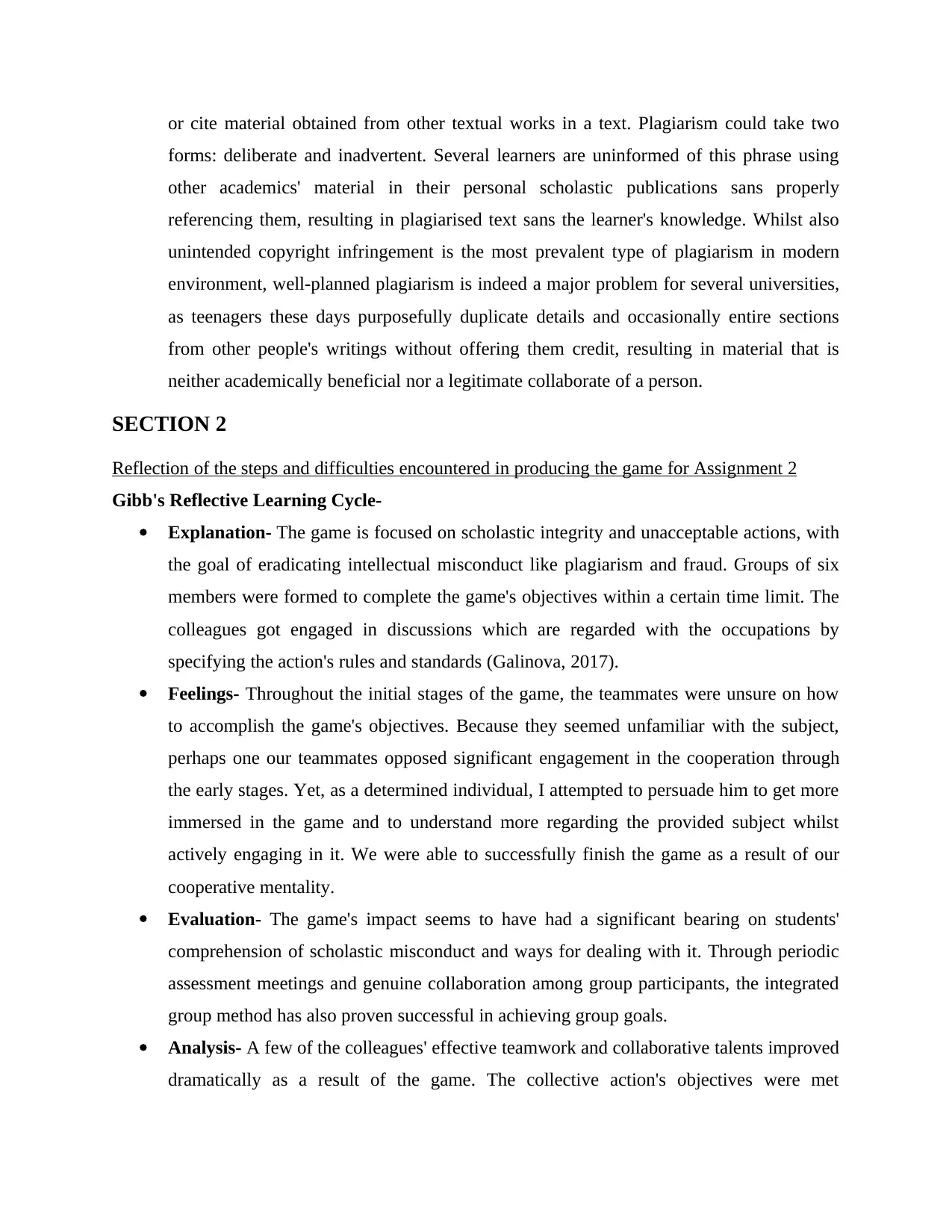
or cite material obtained from other textual works in a text. Plagiarism could take two
forms: deliberate and inadvertent. Several learners are uninformed of this phrase using
other academics' material in their personal scholastic publications sans properly
referencing them, resulting in plagiarised text sans the learner's knowledge. Whilst also
unintended copyright infringement is the most prevalent type of plagiarism in modern
environment, well-planned plagiarism is indeed a major problem for several universities,
as teenagers these days purposefully duplicate details and occasionally entire sections
from other people's writings without offering them credit, resulting in material that is
neither academically beneficial nor a legitimate collaborate of a person.
SECTION 2
Reflection of the steps and difficulties encountered in producing the game for Assignment 2
Gibb's Reflective Learning Cycle-
Explanation- The game is focused on scholastic integrity and unacceptable actions, with
the goal of eradicating intellectual misconduct like plagiarism and fraud. Groups of six
members were formed to complete the game's objectives within a certain time limit. The
colleagues got engaged in discussions which are regarded with the occupations by
specifying the action's rules and standards (Galinova, 2017).
Feelings- Throughout the initial stages of the game, the teammates were unsure on how
to accomplish the game's objectives. Because they seemed unfamiliar with the subject,
perhaps one our teammates opposed significant engagement in the cooperation through
the early stages. Yet, as a determined individual, I attempted to persuade him to get more
immersed in the game and to understand more regarding the provided subject whilst
actively engaging in it. We were able to successfully finish the game as a result of our
cooperative mentality.
Evaluation- The game's impact seems to have had a significant bearing on students'
comprehension of scholastic misconduct and ways for dealing with it. Through periodic
assessment meetings and genuine collaboration among group participants, the integrated
group method has also proven successful in achieving group goals.
Analysis- A few of the colleagues' effective teamwork and collaborative talents improved
dramatically as a result of the game. The collective action's objectives were met
forms: deliberate and inadvertent. Several learners are uninformed of this phrase using
other academics' material in their personal scholastic publications sans properly
referencing them, resulting in plagiarised text sans the learner's knowledge. Whilst also
unintended copyright infringement is the most prevalent type of plagiarism in modern
environment, well-planned plagiarism is indeed a major problem for several universities,
as teenagers these days purposefully duplicate details and occasionally entire sections
from other people's writings without offering them credit, resulting in material that is
neither academically beneficial nor a legitimate collaborate of a person.
SECTION 2
Reflection of the steps and difficulties encountered in producing the game for Assignment 2
Gibb's Reflective Learning Cycle-
Explanation- The game is focused on scholastic integrity and unacceptable actions, with
the goal of eradicating intellectual misconduct like plagiarism and fraud. Groups of six
members were formed to complete the game's objectives within a certain time limit. The
colleagues got engaged in discussions which are regarded with the occupations by
specifying the action's rules and standards (Galinova, 2017).
Feelings- Throughout the initial stages of the game, the teammates were unsure on how
to accomplish the game's objectives. Because they seemed unfamiliar with the subject,
perhaps one our teammates opposed significant engagement in the cooperation through
the early stages. Yet, as a determined individual, I attempted to persuade him to get more
immersed in the game and to understand more regarding the provided subject whilst
actively engaging in it. We were able to successfully finish the game as a result of our
cooperative mentality.
Evaluation- The game's impact seems to have had a significant bearing on students'
comprehension of scholastic misconduct and ways for dealing with it. Through periodic
assessment meetings and genuine collaboration among group participants, the integrated
group method has also proven successful in achieving group goals.
Analysis- A few of the colleagues' effective teamwork and collaborative talents improved
dramatically as a result of the game. The collective action's objectives were met
Paraphrase This Document
Need a fresh take? Get an instant paraphrase of this document with our AI Paraphraser
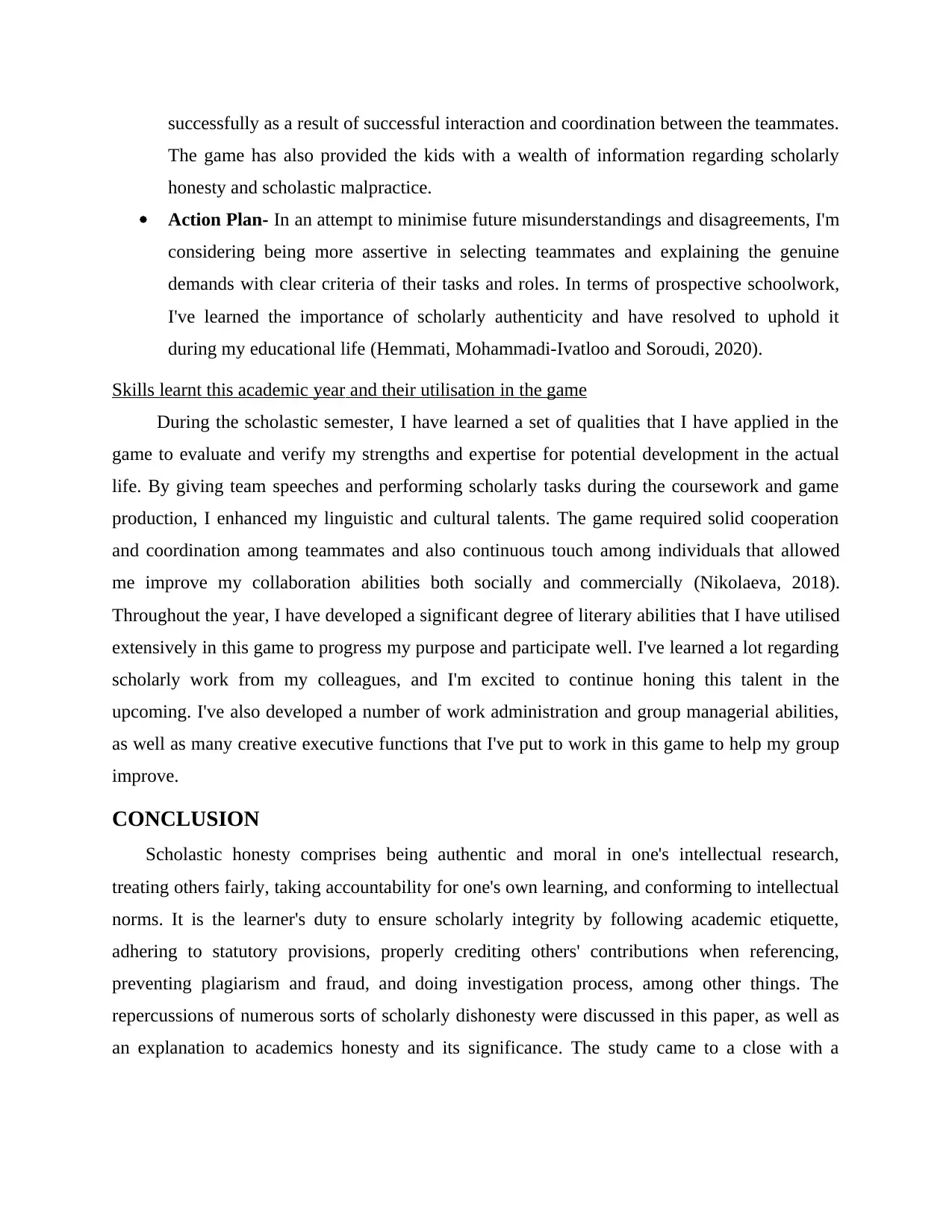
successfully as a result of successful interaction and coordination between the teammates.
The game has also provided the kids with a wealth of information regarding scholarly
honesty and scholastic malpractice.
Action Plan- In an attempt to minimise future misunderstandings and disagreements, I'm
considering being more assertive in selecting teammates and explaining the genuine
demands with clear criteria of their tasks and roles. In terms of prospective schoolwork,
I've learned the importance of scholarly authenticity and have resolved to uphold it
during my educational life (Hemmati, Mohammadi-Ivatloo and Soroudi, 2020).
Skills learnt this academic year and their utilisation in the game
During the scholastic semester, I have learned a set of qualities that I have applied in the
game to evaluate and verify my strengths and expertise for potential development in the actual
life. By giving team speeches and performing scholarly tasks during the coursework and game
production, I enhanced my linguistic and cultural talents. The game required solid cooperation
and coordination among teammates and also continuous touch among individuals that allowed
me improve my collaboration abilities both socially and commercially (Nikolaeva, 2018).
Throughout the year, I have developed a significant degree of literary abilities that I have utilised
extensively in this game to progress my purpose and participate well. I've learned a lot regarding
scholarly work from my colleagues, and I'm excited to continue honing this talent in the
upcoming. I've also developed a number of work administration and group managerial abilities,
as well as many creative executive functions that I've put to work in this game to help my group
improve.
CONCLUSION
Scholastic honesty comprises being authentic and moral in one's intellectual research,
treating others fairly, taking accountability for one's own learning, and conforming to intellectual
norms. It is the learner's duty to ensure scholarly integrity by following academic etiquette,
adhering to statutory provisions, properly crediting others' contributions when referencing,
preventing plagiarism and fraud, and doing investigation process, among other things. The
repercussions of numerous sorts of scholarly dishonesty were discussed in this paper, as well as
an explanation to academics honesty and its significance. The study came to a close with a
The game has also provided the kids with a wealth of information regarding scholarly
honesty and scholastic malpractice.
Action Plan- In an attempt to minimise future misunderstandings and disagreements, I'm
considering being more assertive in selecting teammates and explaining the genuine
demands with clear criteria of their tasks and roles. In terms of prospective schoolwork,
I've learned the importance of scholarly authenticity and have resolved to uphold it
during my educational life (Hemmati, Mohammadi-Ivatloo and Soroudi, 2020).
Skills learnt this academic year and their utilisation in the game
During the scholastic semester, I have learned a set of qualities that I have applied in the
game to evaluate and verify my strengths and expertise for potential development in the actual
life. By giving team speeches and performing scholarly tasks during the coursework and game
production, I enhanced my linguistic and cultural talents. The game required solid cooperation
and coordination among teammates and also continuous touch among individuals that allowed
me improve my collaboration abilities both socially and commercially (Nikolaeva, 2018).
Throughout the year, I have developed a significant degree of literary abilities that I have utilised
extensively in this game to progress my purpose and participate well. I've learned a lot regarding
scholarly work from my colleagues, and I'm excited to continue honing this talent in the
upcoming. I've also developed a number of work administration and group managerial abilities,
as well as many creative executive functions that I've put to work in this game to help my group
improve.
CONCLUSION
Scholastic honesty comprises being authentic and moral in one's intellectual research,
treating others fairly, taking accountability for one's own learning, and conforming to intellectual
norms. It is the learner's duty to ensure scholarly integrity by following academic etiquette,
adhering to statutory provisions, properly crediting others' contributions when referencing,
preventing plagiarism and fraud, and doing investigation process, among other things. The
repercussions of numerous sorts of scholarly dishonesty were discussed in this paper, as well as
an explanation to academics honesty and its significance. The study came to a close with a
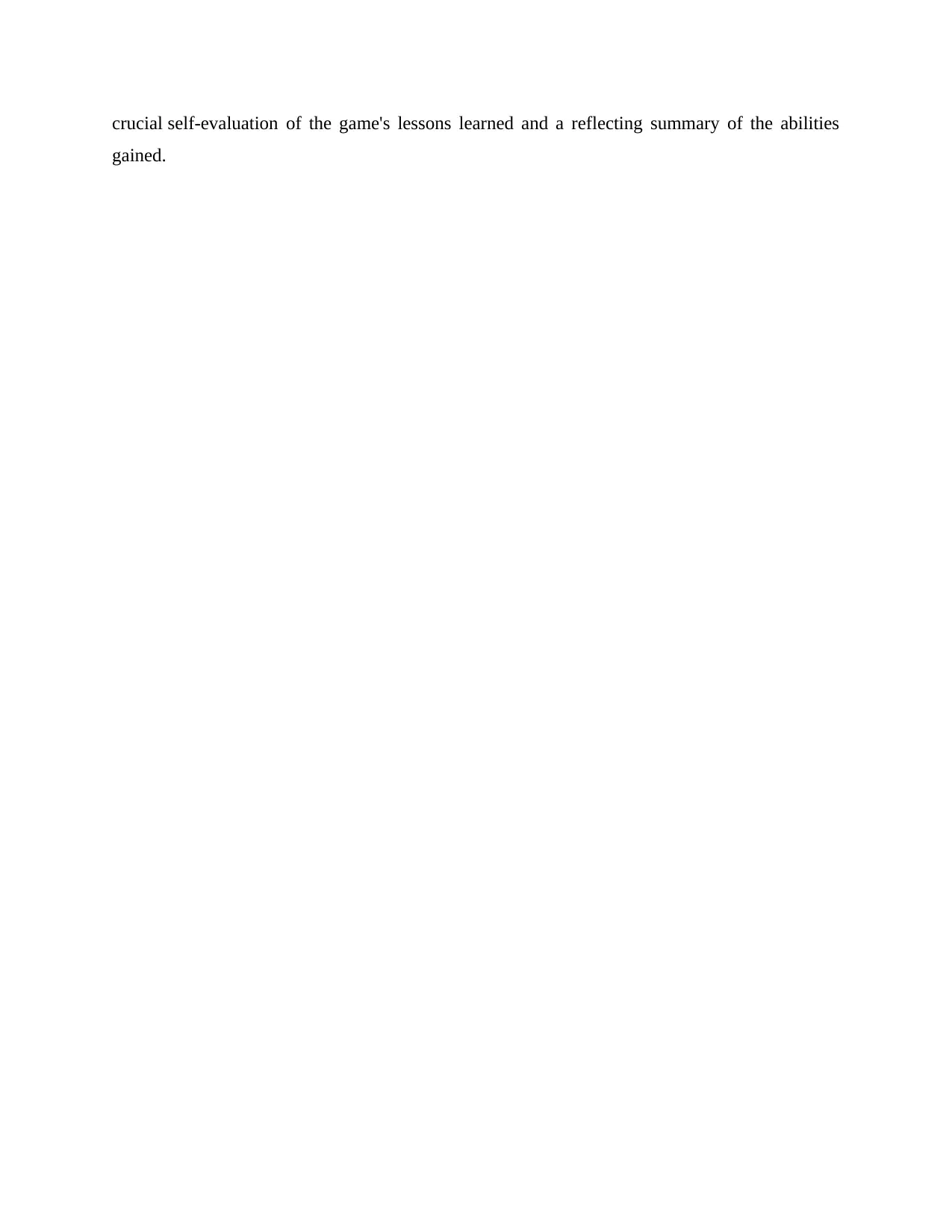
crucial self-evaluation of the game's lessons learned and a reflecting summary of the abilities
gained.
gained.
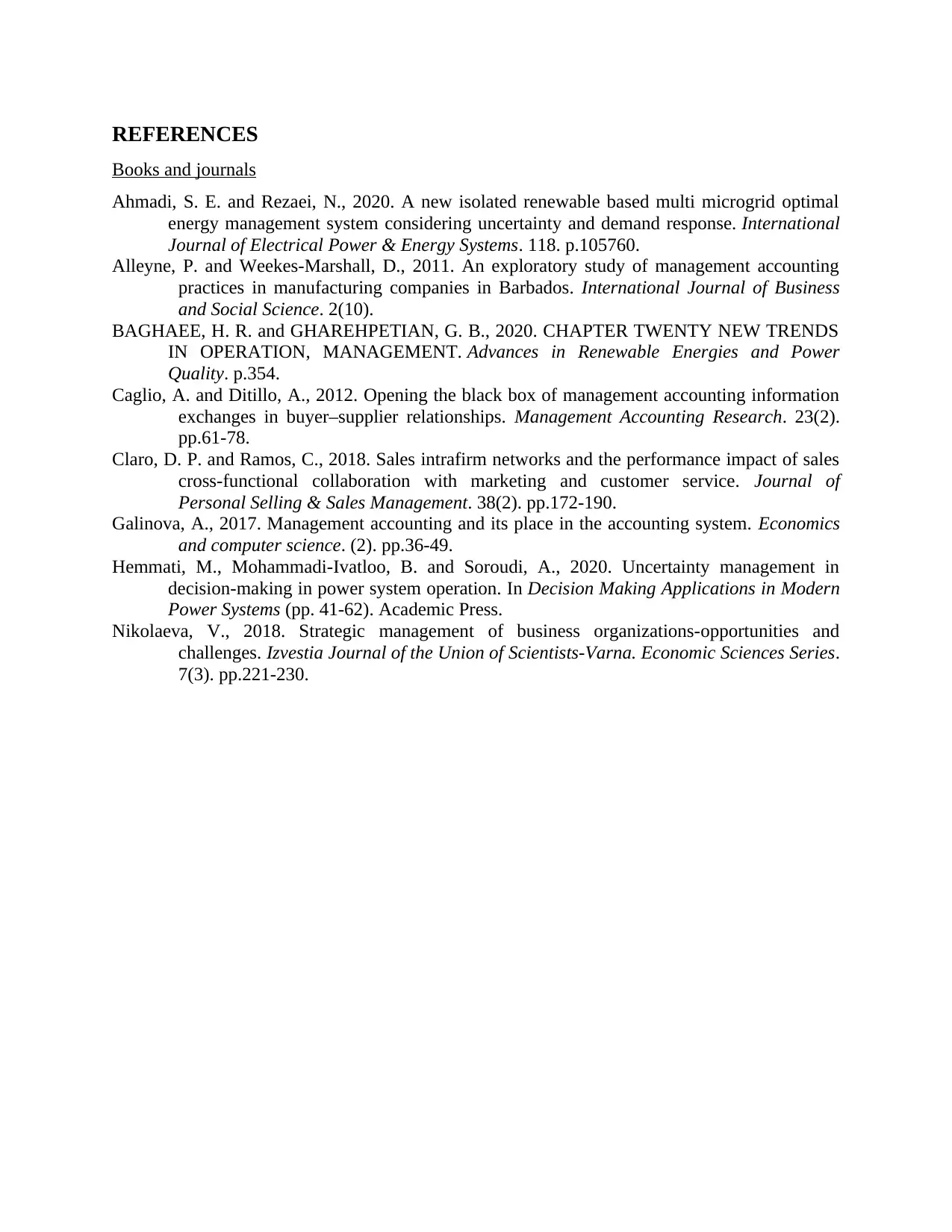
REFERENCES
Books and journals
Ahmadi, S. E. and Rezaei, N., 2020. A new isolated renewable based multi microgrid optimal
energy management system considering uncertainty and demand response. International
Journal of Electrical Power & Energy Systems. 118. p.105760.
Alleyne, P. and Weekes-Marshall, D., 2011. An exploratory study of management accounting
practices in manufacturing companies in Barbados. International Journal of Business
and Social Science. 2(10).
BAGHAEE, H. R. and GHAREHPETIAN, G. B., 2020. CHAPTER TWENTY NEW TRENDS
IN OPERATION, MANAGEMENT. Advances in Renewable Energies and Power
Quality. p.354.
Caglio, A. and Ditillo, A., 2012. Opening the black box of management accounting information
exchanges in buyer–supplier relationships. Management Accounting Research. 23(2).
pp.61-78.
Claro, D. P. and Ramos, C., 2018. Sales intrafirm networks and the performance impact of sales
cross-functional collaboration with marketing and customer service. Journal of
Personal Selling & Sales Management. 38(2). pp.172-190.
Galinova, A., 2017. Management accounting and its place in the accounting system. Economics
and computer science. (2). pp.36-49.
Hemmati, M., Mohammadi-Ivatloo, B. and Soroudi, A., 2020. Uncertainty management in
decision-making in power system operation. In Decision Making Applications in Modern
Power Systems (pp. 41-62). Academic Press.
Nikolaeva, V., 2018. Strategic management of business organizations-opportunities and
challenges. Izvestia Journal of the Union of Scientists-Varna. Economic Sciences Series.
7(3). pp.221-230.
Books and journals
Ahmadi, S. E. and Rezaei, N., 2020. A new isolated renewable based multi microgrid optimal
energy management system considering uncertainty and demand response. International
Journal of Electrical Power & Energy Systems. 118. p.105760.
Alleyne, P. and Weekes-Marshall, D., 2011. An exploratory study of management accounting
practices in manufacturing companies in Barbados. International Journal of Business
and Social Science. 2(10).
BAGHAEE, H. R. and GHAREHPETIAN, G. B., 2020. CHAPTER TWENTY NEW TRENDS
IN OPERATION, MANAGEMENT. Advances in Renewable Energies and Power
Quality. p.354.
Caglio, A. and Ditillo, A., 2012. Opening the black box of management accounting information
exchanges in buyer–supplier relationships. Management Accounting Research. 23(2).
pp.61-78.
Claro, D. P. and Ramos, C., 2018. Sales intrafirm networks and the performance impact of sales
cross-functional collaboration with marketing and customer service. Journal of
Personal Selling & Sales Management. 38(2). pp.172-190.
Galinova, A., 2017. Management accounting and its place in the accounting system. Economics
and computer science. (2). pp.36-49.
Hemmati, M., Mohammadi-Ivatloo, B. and Soroudi, A., 2020. Uncertainty management in
decision-making in power system operation. In Decision Making Applications in Modern
Power Systems (pp. 41-62). Academic Press.
Nikolaeva, V., 2018. Strategic management of business organizations-opportunities and
challenges. Izvestia Journal of the Union of Scientists-Varna. Economic Sciences Series.
7(3). pp.221-230.
1 out of 10
Related Documents
Your All-in-One AI-Powered Toolkit for Academic Success.
+13062052269
info@desklib.com
Available 24*7 on WhatsApp / Email
![[object Object]](/_next/static/media/star-bottom.7253800d.svg)
Unlock your academic potential
© 2024 | Zucol Services PVT LTD | All rights reserved.

